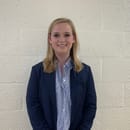During course registration freshman year, I struggled to find courses to fill my schedule (per usual). Academic Advising suggested that I look into a few of the half-semester courses to fill my days. So, I stumbled upon a course entitled “EDU 120: Personal Framework for Career, Part I of the College-to-Career Series.” Had I really just discovered a course that could help me plan my career while simultaneously receive class credit? The answer is yes. This was incredible news for a lost, indecisive freshman who hadn’t even chosen her major yet. Though the course was full at the time, I stuffed this nugget of information in the back of my brain for the following semester’s registration. This fall, I completed both EDU 120 and EDU 220 (because I enjoyed 120 so much). As I reflect now, the college-to-career courses were the most valuable courses I took all semester. Here are the reasons why.
- I learned a ton about myself
I had no idea what to expect when I walked into EDU 120 on the first day of class. I assumed the course would be about finding your career calling, but I did not anticipate learning so much about my personality and interests. One of the first assignments of the class is to take the Meyers Briggs Type Indicator test to determine one’s personality type. When we got our results back, each student was given a list of potential career paths that commonly fit their personality. I was shocked when I stared at my list because I found that many of the jobs I’d considered in the past, or am still considering now, were written. At the beginning of EDU 220, a similar test is taken to determine your values. This test also offers a suggested job list based on one’s results. Additionally, students read a lot of interesting books and write journal entries during the semester to self-reflect about their passions.
- I expanded and reevaluated my potential career choices
Going into the semester, I had no idea what I wanted to do after graduation nor had I even chosen a major or minor yet. I dreaded getting asked, “So, what do you want to do after college?” and found myself feeling anxious and lost about my future. I knew I was interested in English, writing, and dance, but I didn’t know what this meant about me and had no clue how to turn that into a career. Through online research and OPCD events, I learned about many careers that I had never even heard of before that were of interest to me. I also reevaluated jobs that I was considering and eliminated some of these possibilities. Finding out what doesn’t interest you is just as valuable as finding out what does.
- I created a LinkedIn and Handshake
LinkedIn and Handshake are just two of the useful tools that Wake Forest funds for its students. It allows us to connect with professionals and find jobs. In creating accounts on both of these sites, I included my skills, courses I’ve taken, job experience I’ve had, and organizations on campus I participate in. Creating these accounts helped me compile information to put on a resume and taught me how to market myself to employers. This was an incredibly valuable skill to learn as a young undergraduate student because it will set me apart from peers and come in handy when I search for an internship this summer.
- I established a network of professional contacts
One of the class assignments in both EDU 120 and EDU 220 is to conduct three informational interviews. This requires students to connect with an unknown Wake Forest alumni in a field that interests them and ask them questions about their job and career search. The interviews were invaluable. I am so appreciative that the professors for the college-to-career courses push students out of their comfort zones for this project because I formed meaningful connections with many of the individuals I interviewed. Having a robust network of professional contacts is a useful skill to have when looking for a job or internship.
- I made plans to achieve my goals
Lastly, I made an extensive list of goals — both short and long term — that I plan to accomplish through the help of Wake Forest’s OPCD and career coaches. I rarely sit down and think about what I hope to accomplish within the semester or year, but this is an important part of being in college. As I finish these courses, I feel much more confident in my career choices, and I have a clear direction of the steps I will take to accomplish my goals. Through the college-to-career courses, I learned about a diverse range of opportunities that can help me achieve my goals. The courses not only equip you with career readiness skills, but they also teach you about yourself, your passions, your values, and your goals. I have taken immense strides in planning my career this semester and so will anyone who enrolls in a college-to-career course.



